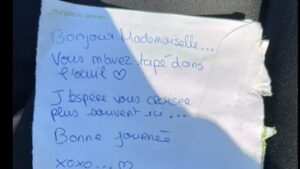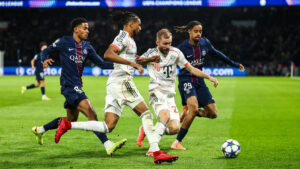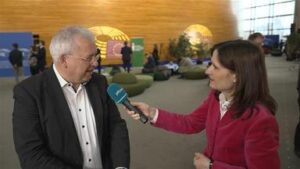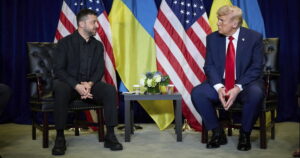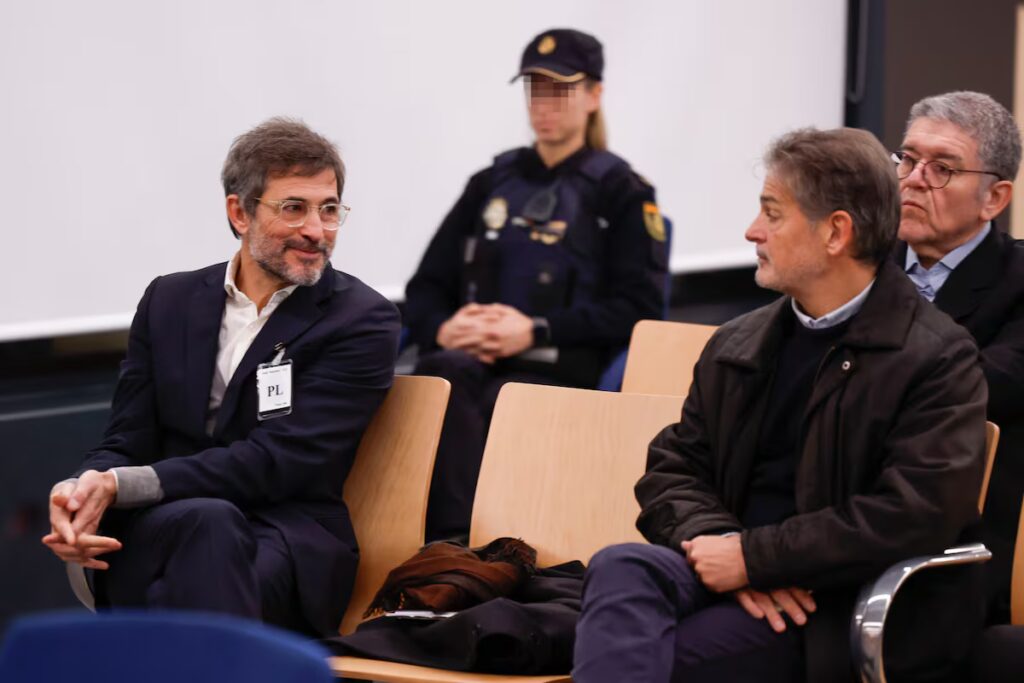
Jordi Pujol’s seven children would not have been able to attend the second hearing on Tuesday in the trial on the origin of the family fortune hidden in Andorra. The National Court has exempted all defendants from this obligation, except when they have to testify. But there were seven of them, punctual for the meeting in an industrial area in San Fernando de Henares (Madrid). Still outraged by the court’s decision (against forensic criteria) to continue the proceedings against their father, they chatted animatedly before sitting in the dock. Three, in the front row, separated; three others, in the second row; and the seventh, Oriol, in the third; all with an undeniable physical resemblance to the former president of the Generalitat which age has only accentuated.
With their 95-year-old father confined to their home except for visits to the doctor, and without their mother Marta Ferrusola, who died a year and a half ago, the boys appear united in the face of the adversities of a trial that threatens them with high prison sentences (from eight to 29 years in prison). But this communion is not at odds with the differences in the line of defense that some and others have already begun to deploy. All of them, accused of illicit association and money laundering, asked for the trial to be canceled and fought, above all, against the “inconcreteness” of the prosecutor’s accusation. Their requests are complementary to each other and reveal a well-elaborated distribution of roles.
From what we have seen so far, four strategies can essentially be distinguished: Jordi Pujol’s defense acts as if the issue does not concern him; the eldest son, Jordi Pujol Ferrusola, launched the legal battle; Josep and Oriol raise the specter of impeachment by appealing to Operation Catalonia; and the others (Marta, Mireia, Pere and Oleguer) try to keep a low profile.
Jordi Pujol, missing. The Prosecutor’s Office accuses Jordi Pujol of having taken advantage of his position as president of the Generalitat (1980-2003) to enrich himself and his family through political corruption. His presence at the trial hangs by a thread. On Monday the court took his testimony via videoconference and decided to keep him (for now) in the trial, despite the fact that forensic experts had concluded that he was in no condition, either physically or mentally, to face him or to defend himself with guarantees. Pujol has shown himself willing to cooperate, but the goal of his lawyers is to make him go as unnoticed as possible: they have not raised a single preliminary issue in his favor (although those of his children would equally benefit him, if they succeeded), and his defense brief takes up only two pages. It is not the Catalan president, the defense seems to suggest, clinging to the thesis that the fortune hidden from the Treasury for more than three decades comes from an inheritance that his father, Florenci Pujol, left to the family in 1980 for fear that the turbulence of the Transition would push the family into ruin.
Jordi junior, fighter. If the political protagonist of The Pujol case is the former Catalan president, the “legal” protagonist is his firstborn, Jordi Pujol Ferrusola, alias Junior. He faces the largest prison request from the Anti-Corruption Prosecutor’s Office (29 years) and his alleged business dealings with businessmen make up the bulk of the indictment. His lawyer, the criminal lawyer Cristóbal Martell (who is also the lawyer of the rest of the family, with the exception of Oriol Pujol), tried to limit the case by referring to technical-legal issues. Martell said there is nothing in the case that calls into question specific public works awards and that this lack of specificity permeates the entire indictment. “How do you fight an abstract statement?” he asked. That path – denouncing the defenseless party for the lack of details in the document – was then followed by the rest of the defences.
Josep and Oriol, the political key. Members of the Pujol clan wanted to make it clear that they too are victims of patriotic police. Operation Catalonia: illegal maneuvers by a group of policemen to attack the leaders of the processes– was brought to light by Josep Pujol and Oriol Pujol, the latter the only one who followed his father’s political career (he became general secretary of Convergència) and the one who always had a different lawyer from the rest of the family. The alleged false declaration of Victoria Álvarez (former lover of the firstborn) or the pressure exerted on the directors of the Private Bank of Andorra (BPA) to obtain data from the family’s bank accounts were used as an argument to request the annulment of the case.
Marta, Mireia, Oleguer and Pere, low profile. The four remaining children wanted to maintain a more discreet profile. Within minutes, his lawyer, Pau Ferrer (of the Martell firm), provided the court with a book published in 1985 (Catalan bank: more than a bank, more than a crisis) to try to demonstrate that even then it was suggested that Florenci Pujol was managing funds abroad; something that, in the absence of documents on the deixa (inheritance), would support his thesis on the origin of luck. In turn, the lawyer tried to distance himself from the other children, providing certificates and titles to demonstrate the “financial ignorance” of Marta, Mireia, Oleguer and Pere. The objective is to establish an additional defense barrier compared to that of its brothers. For these four, the Prosecutor’s Office is asking for eight years of imprisonment for “having benefited” from the clan’s illicit profits and for “contributing to their concealment”.
Entrepreneurs, against the Prosecutor’s Office
The lawyers of the 10 accused entrepreneurs have targeted the anti-corruption charge. Their reproaches of alleged “impotence” due to their “lack of concreteness” followed one another. According to them, the public prosecutor put a generic story on the table, with argumentative “pirouettes” to attribute the crimes to the defendants without delimiting the offenses attributed to each. “This defense had some problems in articulating the strategy and memory of the defense, given the indeterminacy of the memory of the prosecutor,” protested the representative of Andorra Francesc Robert Ribes, who the investigating judge José de la Mata indicated as one of the people used by Jordi Pujol Ferrusola to move millionaire funds abroad.
The complaints happened. “I understand that the accusatory principle requires marking the path of what will be resolved in the trial, it will be a story of facts that, like a mirror, allows the reaction of the defense”, introduced Carles Monguilod, Gustavo Buesa’s lawyer, before launching his offensive: “There are 217 pages of indictment, with facts that would hypothetically describe the conduct accused of him. But I still don’t understand what I have to defend him from”. “After 13 years, the origin of the profits remains unknown today,” added Jorge Barrigón’s defense. “This case begins in 2012, how is it possible that the prosecution failed to highlight a single document falsified by Mr. Bernardo Domínguez Cerecedes, despite accusing him of a crime of document falsification? And, if (the origin) of the funds is unknown, what is the antecedent of the crime to (attribute it to) money laundering? None. So, what am I doing here and how will I take care of my time”, adds the lawyer ironically. of the Mexican entrepreneur Luis Jordana de Pozas.
The lawyer José María Fuster-Fabra, defender of Josep Mayola, expressed himself along the same lines: “The public prosecutor tells a fact in which we talk about typical business acts, which go beyond criminal law. And I don’t really understand how a story that seems to lead to a sort of influence trafficking, can lead to money laundering. Well, because there can’t be influence trafficking because there are no public tenders. And, when they don’t know what to do, they say, they use money laundering. (…) The prosecutor doesn’t explain and we cannot defend ourselves from what we don’t know,” he criticized.
The Prosecutor’s Office and the Public Prosecutor’s Office will take the floor this Wednesday to answer the previous questions raised by the defense.
